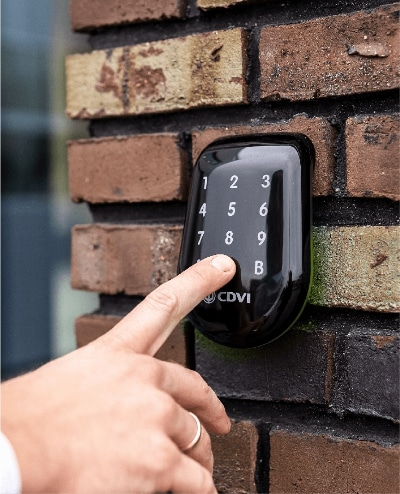Basics of Access Control
Carrying keys is old school and very unsafe in comparison to the basics of access control systems. Historically, access was partially accomplished through keys and locks. When a door is locked only someone with a key can enter through the door depending on how the lock is configured. Mechanical locks and keys do not allow restriction of the key holder to specific times or dates. Nor do mechanical locks provide records of the key used on any specific door. Keys can also be easily copied or transferred to an unauthorized person. When a mechanical key is lost or the key holder is no longer authorized to use the protected area, the locks must be re-keyed.
The basics of access control
are about limiting access to authorized individuals in physical spaces. It's about deciding who can enter, where, and when. Electronic access control systems solve the key/lock issues by using various credentials instead of keys. When access is granted, the door unlocks for a set time and records the transaction. If denied, the door stays locked, and attempts are logged.
Access control systems work by sending credential information to a control panel, which compares it to a list and grants or denies access accordingly. Common types of credentials include mobile phones(which most people are never without), access cards, fobs and biometric scans. Access points, usually doors, can be controlled electronically, often using readers and switches. The system decides access based on a electronic list, which can be stored centrally or at the access point itself.
Most commonly, there are single-factor and two-factor transactions for the basics of access control systems.
- With single-factor transactions, using your cell phone in proximity or swiping a card or fob at a reader grants access, very similar to a key.
- With two-factor transactions using your cell phone in proximity or swiping a card or fob at a reader then requires a code or biometric input before access is granted. Two-factor access control is always recommended for external doors or higher security areas inside like server and record rooms.
Electronic access control systems offer many advantages over traditional lock and key systems:
Enhanced Security:
Electronic access control systems provide a higher level of security compared to traditional lock and key systems. They offer features such as biometric authentication, keyless entry, and centralized control, making it easier to manage and monitor who has access to specific areas.
Flexibility and Scalability:
These systems allow for easy management of access rights, enabling administrators to grant or revoke access permissions remotely. They are highly scalable and adaptable to changes in organizational needs, such as adding or removing users or modifying access levels.
Audit Trail:
Electronic access control systems maintain detailed logs of access events, including who accessed a particular area and when. This audit trail can be invaluable for security investigations, compliance purposes, and tracking employee or visitor movement.
Integration with Other Systems:
Many electronic access control systems can integrate with other security and building management systems, such as security systems, video surveillance, and time and attendance systems. This integration enhances overall security and streamlines management processes.
Remote Access Management:
With electronic access control systems, administrators can manage access permissions remotely, from any location with internet access. This capability allows for real-time adjustments to access rights, making it easier to respond to security threats or changing circumstances.
Reduced Risk of Unauthorized Access:
Electronic access control systems eliminate the risk of lost or stolen keys being used to gain unauthorized access. Access credentials such as keycards, PIN codes, or biometric data can be easily and instantly be deactivated or replaced if lost or compromised.
Customization and Control:
Administrators have granular control over access permissions, allowing them to customize access rights based on roles, departments, or individual needs. This level of control helps ensure that only authorized individuals can access specific areas or resources.
Increased Convenience:
Keyless entry and automated authentication processes make electronic access control systems more convenient for users compared to traditional keys. Employees or visitors no longer need to carry physical keys, reducing the risk of loss or inconvenience associated with forgotten keys. If you forget your fob or access card, administrators can remotely grant access from smart phones while you stand at the locked door. Amazing.
Overall, electronic access control systems offer a comprehensive solution for managing and enhancing security in various environments, from small businesses to large enterprises.
A few of the many questions we may ask in establishing the right solution for you:
- What level of access control are you looking for?
- What type of credential would be convenient ?
- How many people would require credentials?
- Recording and reporting requirements?
- System administration location?
- Amount of access level requirements?
- Time control on doors?
- What do you want to secure?
- Are you looking to control public to private areas, control staffing access to sensitive areas?
- Keyless entry only or complete control of door position?
- Integration with security, for either disarming, or include door position and forced alarm?
- Number of doors?
- Future expandability?
At Blanchard Security, we offer several different types of systems from different manufacturers so we can choose the right solution to meet your specific needs, control and budget. Contact us to learn more on the basics of access control systems and how they may be able to better support your office, location or business.
Blanchard Security provides access control solutions throughout Central and Northern Vancouver Island with offices in Parksville and Campbell River. Remember, for the best in security solutions, it means we come to you, our offices are just where we keep the coffee warm and come together to plan tomorrow's customer visits. Schedule an appointment for access control solutions from Blanchard Security
